If you are a new owner of a guinea pig, it may take you some time to understand your pet’s behavior and mannerisms. Your guinea pig has a variety of ways to show happiness, affection, and even fear.
What are guinea pigs afraid of? Guinea pigs are afraid of larger animals, loud noises, sudden movements, vets, and other people around; in some cases, they can be scared of their owners. Being left alone and improper handling or grooming can also make them scared.
As you bond with your guinea pig, it is essential to understand what exactly your pet fears so that you can help it overcome those fears.
Guinea pigs will give you signs which indicate that they’re scared. So in this article, we’re going to give you information about what guinea pigs are afraid of, what signs they show when they’re scared and how to calm them down after they have been scared by something. Let’s begin!
Table of Content
How Do You Know if a Guinea Pig Is Scared?
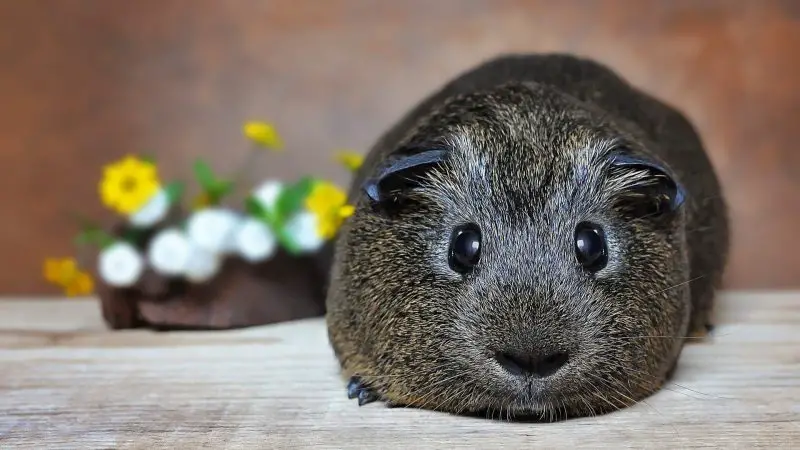
There are some signs that guinea pigs show when they’re scared of something. Guinea pigs can change their behavior and do strange things like hiding a lot (more than usual), running, or making different noises.
Signs Your Guinea Pig Is Scared
If you feel that your guinea pigs are afraid, make sure to recognize these signs to help your guinea pigs not be scared:
Strange Noises
These beautiful pets have behavioral characteristics that will alert you with some sounds when they feel afraid or threatened. Guinea pigs usually have a variety of purrs and chirps that they make when they are happy, sad, or scared.
If they are making short and anxious purrs, they are fearful of their environment. Your guinea pig will bare and chatter their teeth as a warning to stop whatever you are doing to them, whether it is handling them a certain way or introducing them to a new person or pet.
Freezing
Guinea pigs tend to freeze when they are scared, and in that situation, they will fully dilate their eyes, don’t move, and don’t react to your voice.
This usually means that they are on guard against danger. It may take some time before your guinea pig trusts you enough to engage with you when you approach them for a meal or cuddle time.
Moving Around
Just like humans or any other pet, guinea pigs will naturally fidget or move around a lot when anxious. If you are holding or grooming your pet when they show this behavior, then you should place them back in their cage so that they will feel safe again.
If a guinea pig is scared, it will run away when it hears even the smallest movement or noise because guinea pigs don’t like loud sounds or sudden movement. Make sure to put their cage in the quiet place of your home.
Note: This behavior from them is temporary, and it will change after they get used to the environment around them.
Hiding a Lot
Guinea pigs love to hide, and this is why you need to put some hideouts in their cage. But if your guinea pig hides a lot and if it refuses to leave its hideout, that’s not normal behavior, and it can be a sign that your little pet is scared of something.
They love to rest and sleep in their hideouts, but if they spend a lot of time there and refuse food or play with other guinea pigs, you need to do something to make them feel safe.
Refusing Food
Guinea pigs love to eat, and normal behaving guinea pigs will never refuse the food. But scared guinea pigs will refuse food in front of you and eat only when you are not in the same room.
You need to remember that food is the best connection between you and your guinea pig, so refusing the food can be a sign of fear or illness.
Guinea Pig Fears: What Are They Afraid Of?
Larger Animals
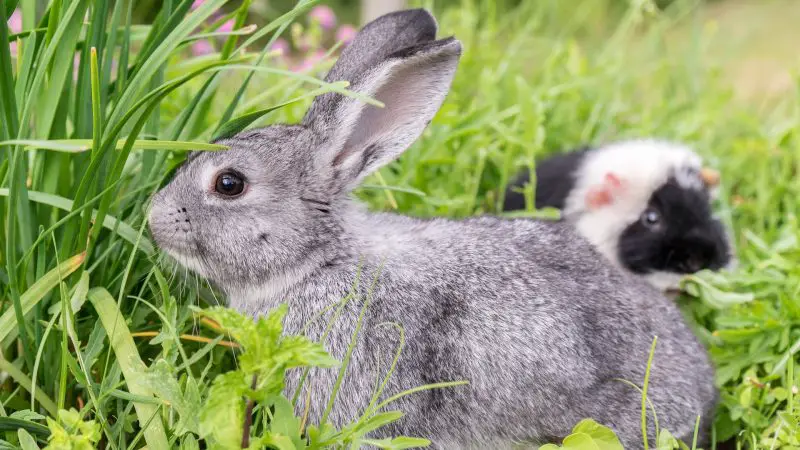
You’ll notice that your guinea pig runs and hides when your other pets come near, even if they are in their closed cage. Guinea pigs are small rodents that larger animals hunt in the wild, so they naturally fear all larger animals.
Even if your larger pets want to make friends with your new pets, it is essential to do this pet bonding gradually. Bond with your guinea pigs first, then introduce them to the other four-legged members of your family.
Also, if you are interested, you can find other helpful information on topics such as if guinea pigs can live with dogs, cats, or rabbits.
Loud, Sharp Noises
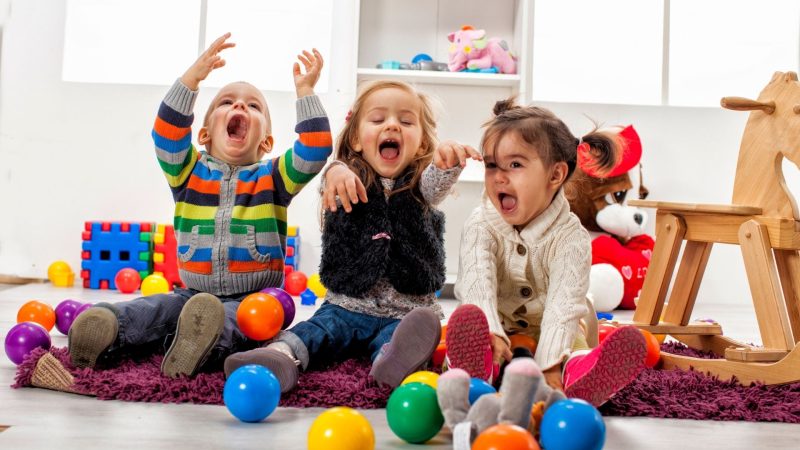
After you bring your new pet home, they will naturally be afraid of their new surroundings. Just like if you brought home a newborn, you can’t assume that they will be used to everything that you do.
If you like to blare your television or radio, or if you have children, place your guinea pigs in a quieter area of the house.
Make sure that you engage with them often in order to bond with them, and then gradually introduce them to the other natural sounds of their new home.
Also, if you are doing any home renovations, where there is a lot of hammering or similar loud noises, that is probably not the best time to adopt a guinea pig. Guinea pigs are naturally afraid of any sharp and loud noises. To them, these sounds can signal danger.
Even if your guinea pig has been a member of your family for years, these sounds may still scare them. Place the cage in a quieter area of the house if you need to hang a picture or replace a cabinet. It will shield them from the intensity of the sounds and make them feel safer.
People
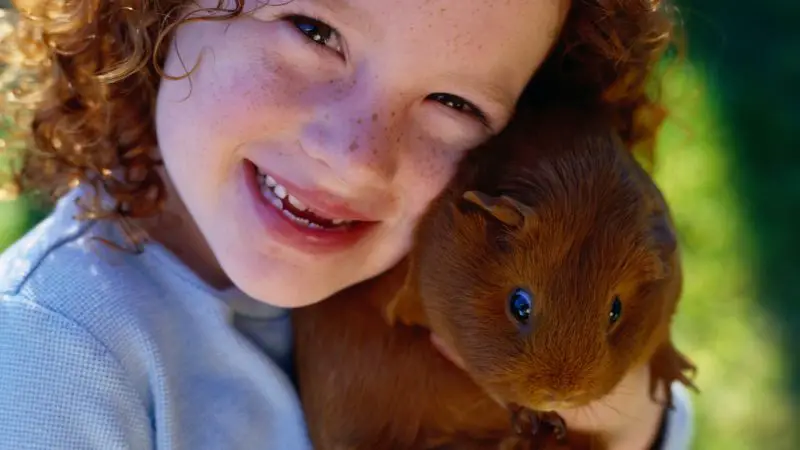
For the most part, guinea pigs are naturally afraid of people, especially if they don’t recognize the person. This may be because they do not trust the person they have encountered, but it may also be a sign of prior abuse.
Many guinea pigs adopted from shelters or rescue organizations may have been mistreated in the past. You should ask these questions before bringing your new family member home. Abused animals always require more care and love, so you should be prepared to invest some extra time to make your guinea pig feel safe again.
Even if your guinea pig hasn’t been abused, they will still fear humans. It is in their nature. When introducing your new pet to the other members of your family, try to do this gradually.
If you were the first to bond with your guinea pig, make sure you are present when introducing it to your spouse, children, and other family members.
When adopting your guinea pig as your child’s first pet, make sure you explain to them to be patient with their new pet. It takes time to bond with an animal. Also, monitor your child’s guinea pig handling to ensure that it is not harmed.
Being Taken Out of Their Cage
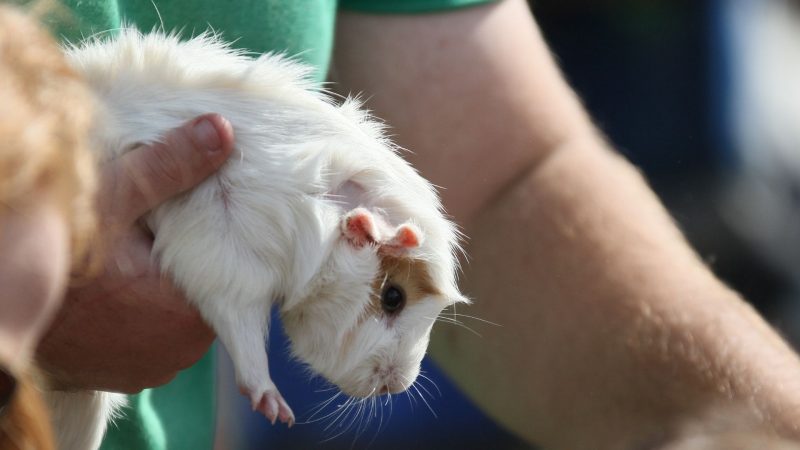
The cage is a symbol of protection for guinea pigs. Your new guinea pig may run and hide when you open their cage. This is natural because guinea pigs are scared to be picked up, especially if they are afraid of the owner.
If you need to take your guinea pig out of the cage to clean it and replace the bedding, then you need to gently persuade your pet to come out of hiding with soft words and phrases.
When interacting with your guinea pig, try to reach into the cage and pet them without picking them up.
Guinea pigs are naturally cuddly, and they love attention, so this may encourage your new pet not to fear being taken out of their comfort zone every time you approach.
Being Alone
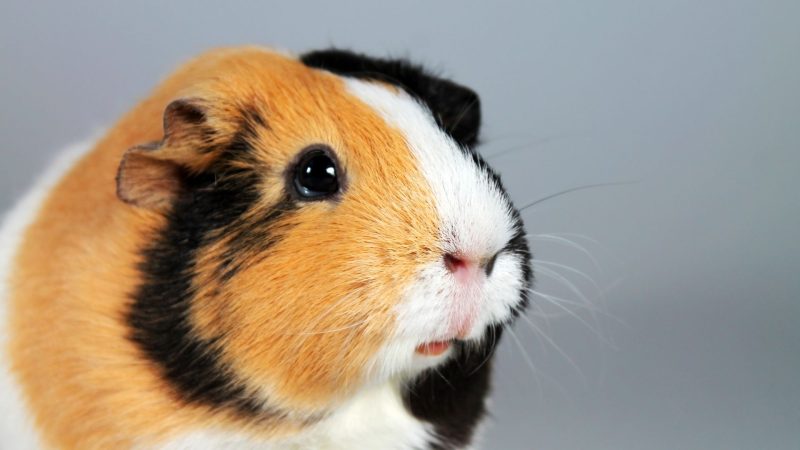
Guinea pigs are very social, and they are some of the friendliest pets you can adopt. They thrive in social situations, especially with other guinea pigs.
When choosing a guinea pig, consider selecting more than one. If your guinea pig has a friend, they will be much happier in their new surroundings.
If you only have one guinea pig, and you would like to adopt another, gently introduce your new guinea pig to its new cage mate watch for signs of aggression and fear.
For the most part, your guinea pigs will welcome the company, and your pet will bond immediately with their new sibling. If you notice that your pet is aggressive to its new cage mate or fighting, keep them in separate cages.
Keep their homes close to each other so that they can still interact. This way, they will have the company of each other while asserting ownership over their own space.
Veterinarian

Imagine you were the size of a guinea pig, and a giant took you out of your home and brought you into an environment where another giant started to poke and prod you with their hands and hard, metal instruments.
If this doesn’t sound very appealing, then you know precisely how your guinea pig feels about trips to the veterinarian.
Check-ups are essential to the health and livelihood of your guinea pig, but these trips can stress them out. Comfort your guinea pig as much as possible during these trips while allowing the medical professional to do their job.
Talk to your guinea pig in the waiting room, and hold them close while you wait for the doctor. Even in these unknown surroundings, making them feel safe can make the vet visit less traumatic for your guinea pig.
Grooming
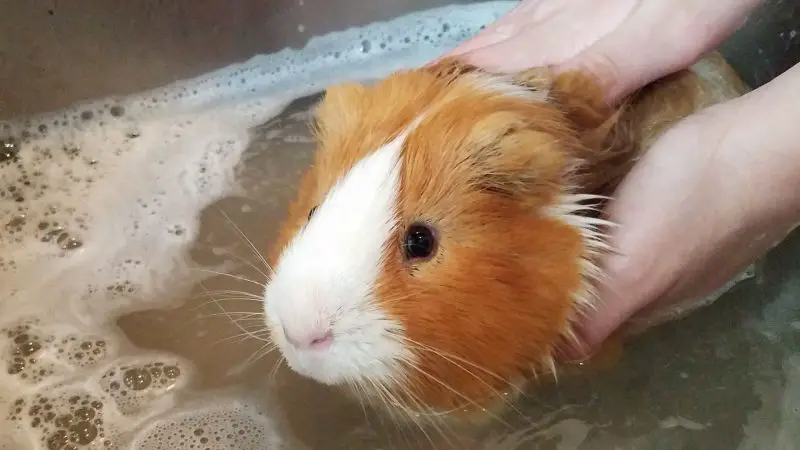
Grooming is a normal part of any pet care. Clipping your guinea pig’s nails and bathing them can preserve their health and happiness.
If you neglect to cut their nails, they can grow into the bottoms of their feet, requiring surgery to remove them. Guinea pigs self-groom, but they also need baths every three months or so (more often if they get dirty).
The first time you groom your guinea pig is always the hardest. They will fidget, squeal, and possibly try to bite you. This means they are afraid of what you are doing to them. Be as gentle as you can, and try to relax your guinea pig into a state of calm.
Don’t hold your pet down and force them to endure grooming if they are extremely agitated. Eventually, as you bond with your guinea pig, these grooming techniques will not bother them so much. They may even come to enjoy it.
Are Guinea Pigs Afraid of the Dark?
Considering that guinea pigs are prey animals and love to hide, it’s normal for them to prefer the dark. So, guinea pigs aren’t afraid of the dark, and we can say that they love dark places because they feel safe there.
Also, many people believe that guinea pigs can see in the dark, but this claim hasn’t been proven yet. Most of the rodents have night vision. If we consider that guinea pigs don’t love the sun that much and can move in the dark tunnels, maybe they can see in the dark as well. Guinea pigs feel safe and comfortable in the dark, and they love to sleep in darker places.
Be sure that your guinea pig has a lot of places to hide in its cage, don’t place the cage near the window where there is a lot of sunlight and turn off the light during the night.
Why Is My New Guinea Pig Scared of Me?
Do you have a feeling that your new guinea pig is scared of you? That is a normal guinea pig’s behavior, but it is important to note that it is only temporary in most cases. Guinea pigs have lived in the wild, and they were prey animals for various predators.
This is why being scared of someone is their instinct, and they need time to adapt to you and their new environment. They will hide, eat, and drink only when you are not in the room, or they will probably make some strange sounds to let you know that they are scared. It will be hard for you to take them out when you want to clean the cage.
Hiding and running away from you doesn’t need to be a sign that guinea pig is afraid of you, as they are also timid. Guinea pigs have different personalities, and some are less or more shy.
You just need to take proper care of them and easily build a relationship between you two, and in no time, your guinea pig will stop being scared or shy.
How to Make Your Guinea Pig Not Scared of You?
As an owner, you can do a lot of things to make your guinea pig not be scared of you, such as the following:
Providing a Quiet Place and No Sudden Movements
First of all, be sure to put the guinea pig’s cage in a more quiet place, and don’t speak loudly, don’t make any sudden movements, or make any loud noises.
After a few weeks, you can slowly start relaxing in front of your guinea pig because it takes them a few weeks to get used to your movements and your presence.
Food Bonding
Be careful when you are feeding them, don’t give guinea pigs food from your hand if they run away from you. Just put food in the cage and leave the room. After some time, when you notice the guinea pig’s favorite food, you can give them that exact food from your hand. Food is the best way to bond with your guinea pigs because they will remember you as a food source, but you need to be patient when doing this.
Companionship From Other Guinea Pigs
Guinea pigs don’t like to be alone, so they need to have a companion, especially when you’re not home. You can get two or more guinea pigs. In the wild, they have lived in groups, and when there are more of them in the cage, they will feel safer and be less scared of you.
Right Approach
If your guinea pigs are running away from you when you want to pick them up from the cage, be sure to first talk with them slowly and give them some food (bribe them). Don’t handle them for a long time or often because they don’t like that so much.
Scared Guinea Pig Behavior
What Sound Does a Guinea Pig Make When It’s Scared?
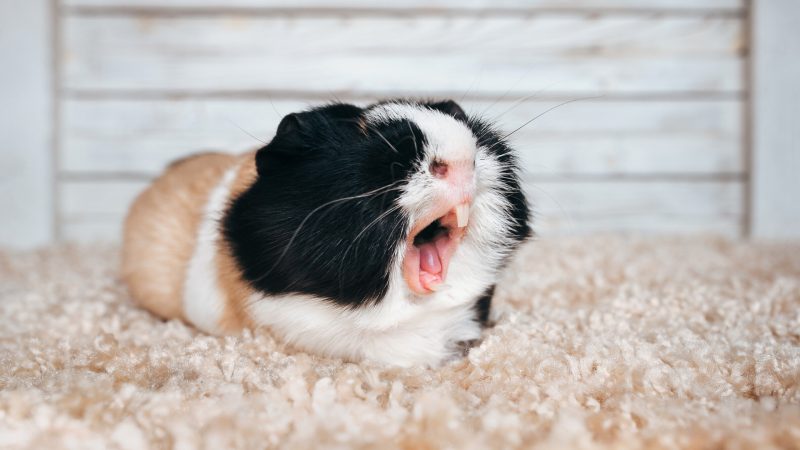
Guinea pigs can make different types of noises, and for you, as the owner, it’s very important to know how to decipher them.
There are happy guinea pig sounds, unhappy guinea pig sounds, or scared guinea pig sounds, so you need to know the difference between them. Some scared guinea pig noises are:
Shrieking
This sound means that something is not right with your guinea pig. A guinea pig can be in pain or just scared. Shrieking is one of the scariest noises that guinea pigs can make.
Growling
If your guinea pig is growling, that means it’s very scared of something or threatened by someone. Check immediately what’s the problem, because this sound doesn’t happen very often.
Squealing
Squealing is another unpleasant guinea pig noise. It can be a sign that your guinea pig is scared but also sick or just hungry. So it’s essential to find what’s wrong with your pet or just go to the vet.
Can Guinea Pigs Die From Fear?
Unfortunately, there is a possibility that your guinea pigs can die from fear. Guinea pigs are very affectionate and gentle animals and they can be easily scared. If they feel a lot of stress they can get a heart attack or stroke.
Do Guinea Pigs Pee Out of Fear?
If your guinea pigs pee right after you pick them up, then maybe the reason for that can be fear or stress. Guinea pigs usually don’t love to be picked up from their cage or handled a lot for a long period because they pee a lot.
Every time you hold them for too long, they might pee on you. But, if your guinea pigs pee immediately when you pick them up, then try to pick them up slowly or speak with them gently before you put your hands on them.
How to Calm a Scared Guinea Pig?
Understanding your guinea pig’s behavior goes a long way in developing a lasting bond with the newest member of your family. Similar to bonding with a dog or a cat, spending quality time with your guinea pig will encourage a relationship between the two of you.
If your guinea pig becomes scared during your quality bonding time, always put them back in their cage where they will feel safe. Speak with your guinea pig slowly, don’t make sudden movements, and leave its favorite food in the cage if you notice it is scared of something.
There isn’t an exact time frame for forming a lasting relationship with your guinea pigs. It may take several days or weeks before your guinea pig welcomes your interactions.
Encouraging positive quality time with lots of love and care will make your guinea pigs happy and healthy. Pretty soon, you won’t be able to imagine your life without them.
Summary
Guinea pigs are prey animals, and it’s very normal and natural that they can be scared. All you can do is learn signs that indicate when your guinea pig is scared and know what you need to do to calm it. Food, water, proper environment, and bedding is the best way to your guinea pig’s heart.
Also, don’t leave your guinea pig alone. They have always lived in groups, so get two or more of them. The most important thing with any pet is to be patient.
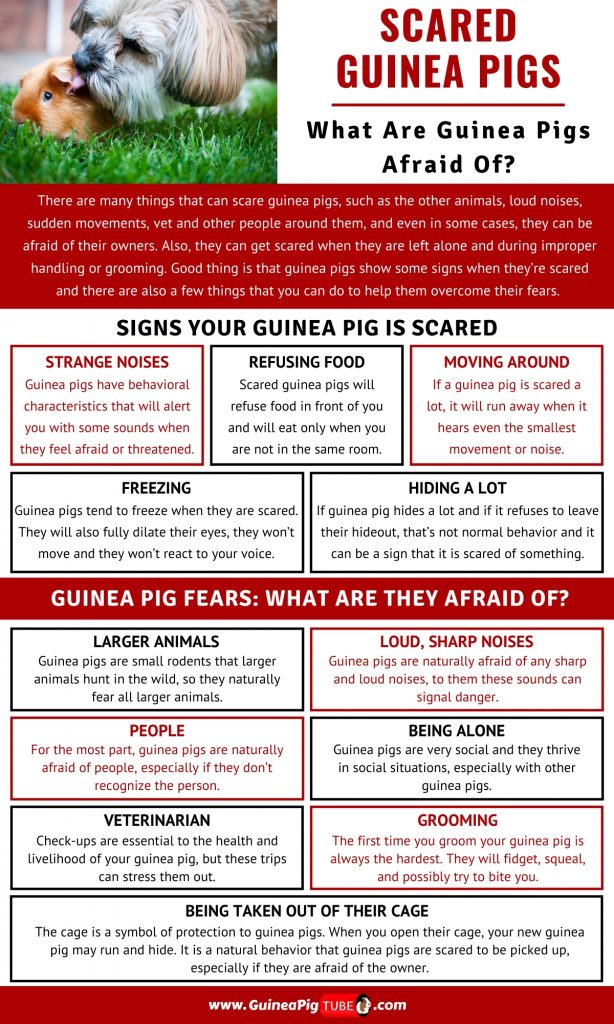
List of Sources
Visiting the Veterinarian With Your Pet: What Happens When Your Pet Goes to the Vet?
